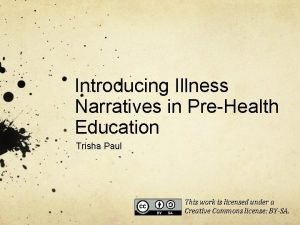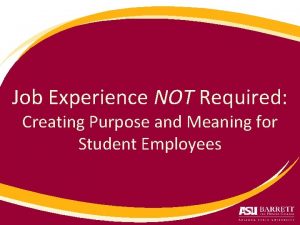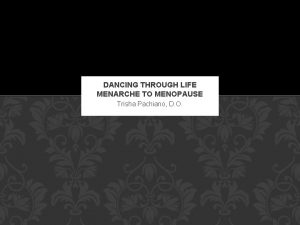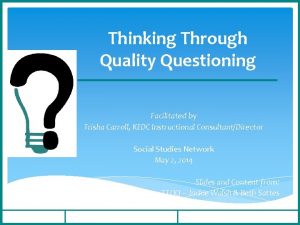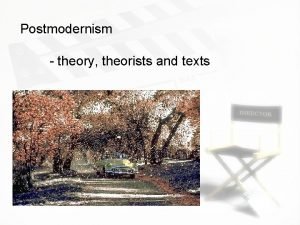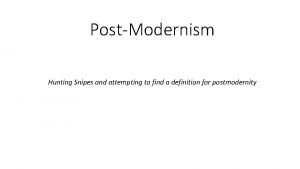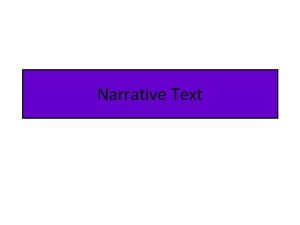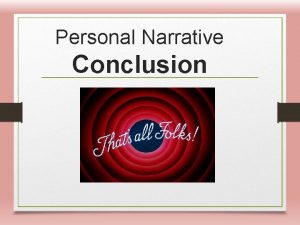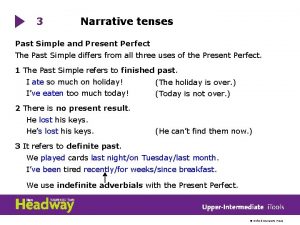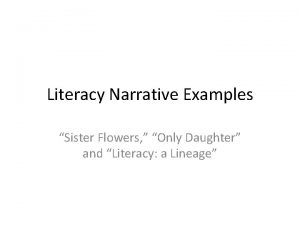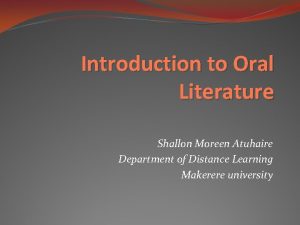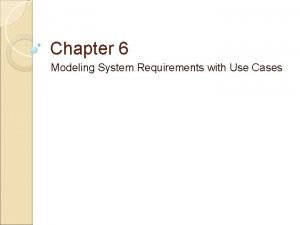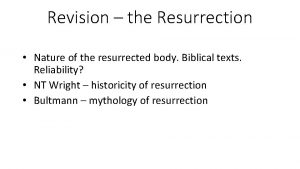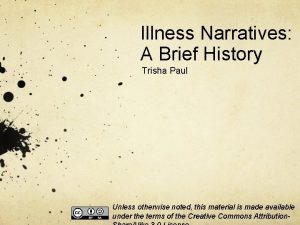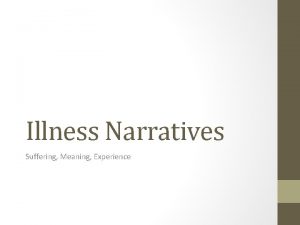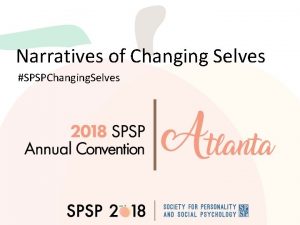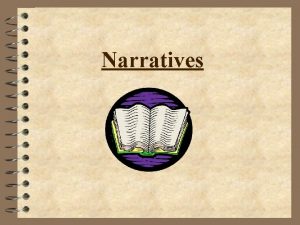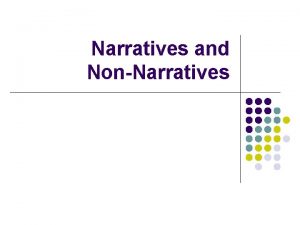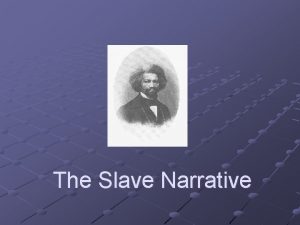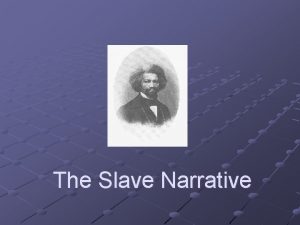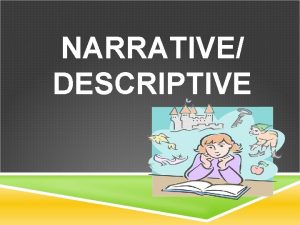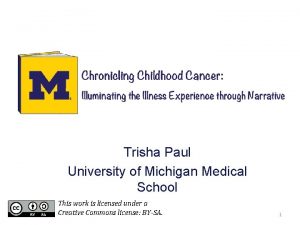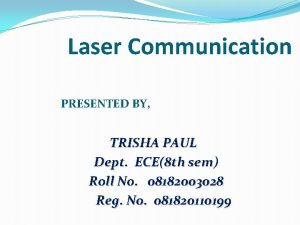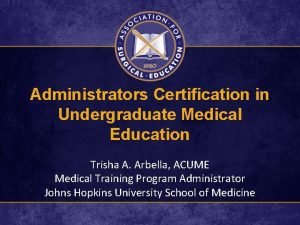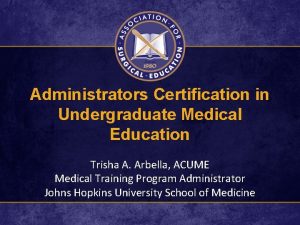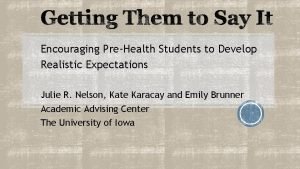Introducing Illness Narratives in PreHealth Education Trisha Paul

























- Slides: 25

Introducing Illness Narratives in Pre-Health Education Trisha Paul This work is licensed under a Creative Commons license: BY-SA.


Honors 135 “to introduce students who are just beginning their academic careers to the vast array of academic possibilities in the College and the University” Elective nine week course For 1 st year undergraduates in the Honors Program Small discussion-based, pass/fail seminar Designed and taught by Honors senior undergraduates

Grand Rounds How do different genres of literature illuminate illness differently? What aspects of illness are made visible by some genres, overshadowed in others? What insight do literature and other artistic mediums provide into the illness experience? What are their limitations? Ultimately, why should we study literature from the perspective of illness narratives? How does this perspective add dimension to literary analysis, and how can it be applied to patient interactions in the medical field?

Why are you interested in taking this course? “Wanted to take something kind of different and focus on really learning rather than on stressing about grades. ” “I'm looking into a career in medicine but I also love to read, so the topic seemed interesting. ” “I am very interested in medicine and I thought that it would be really cool to learn about it through another manner, not so scientific. ”

Weekly Topics Week 1: Introductions, Syllabus, Welcome to Blogging. Week 2: Diagnosing Illness Narratives. Week 3: Living Beneath The Bell Jar of Depression Week 4: A Literal Lock-in- The Body’s Entrapment of the Mind. Week 5: Embracing Illness- (Dis)Ability in the Blogosphere Week 6: Meeting Cancer, The “Emperor of All Maladies” Week 7: Guest Speaker- Dr. Janet R. Gilsdorf, M. D. Week 8: Facing the Ultimate Illness: Death and Children’s Literature Week 9: Show and Tell

Weekly blogs


What would you like to learn more about after taking this course? “I really want to read more illness narratives because I find them fascinating. I'd also like to learn more about how illness narratives can help others cope with their own illnesses, and what they can teach people who have never experienced the illness being described. ” “This course actually made me more interested in medicine and started to sway my major into one that would allow me to be Pre-Med. But after this course I would like to learn about these different diseases and disabilities and learn how to expres that these people are normal people simply experiencing hardships. ”

Discussion Questions Why should we study illness narratives?

Why should we learn about illness narratives? “They constantly shape the way we view illness, whether we realize it or not. ” “It seems that everyone is or will be suffering from some sort of illness at some point in their lives. The better we understand how people may react to certain illnesses, the better we can assist them − we can learn more about society and people by reading illness narratives. ”

Why should we learn about illness narratives? “So that we can be more sensitive to the experiences of those who are suffering from an illness. ” “They provide valuable and often unheard perspectives. Why presume to know about something when we can hear about it from someone who has experienced it? ”

Discussion Questions Why should we study illness narratives? What do we hope students will learn from these studies?

How has your definition of “the art of medicine” changed, if at all? “I think this class made me analyze medicine more. I never really thought so much about how medicine has become all about fixing a problem instead of healing a person in so many cases. Focusing on the patient as a whole seems like an art to me. ” “Before, I thought of it as personalized medicine and being compassionate with patients. Now, I realize that there is so much more complexity in the human connection aspect of medicine. ”

Discussion Questions Why should we study illness narratives? What do we hope students will learn from these studies? When is the most appropriate time to introduce illness narratives within the trajectory of their education?

Discussion Questions Why should we study illness narratives? What do we hope students will learn from these studies? When is the most appropriate time to introduce illness narratives within the trajectory of their education? How can illness narratives by incorporated effectively into pre-health education?

Next Steps Pilot a graded, full term course with 12 students Follow-up to assess potential long-term impacts Explore different student populations Non-Honors Pre-PA Pre-Pharm Pre-Social work

What is the most important message that you’ve learned from this class?

“There isn't just one ‘normal’ and we shouldn't try to force our own ‘normal’ on other people. ”

“Disease, disability, and illness do not make a human any less normal or real. ”

“To be more sensitive to the messages that those suffering from an illness are trying to convey. ”

“I think the most important lesson I learned is to listen. Also, if I become a doctor, I know how important it is to focus on the patient as a whole. ”

Special Thanks to Supporters Dr. Arno K. Kumagai University of Michigan Medical School Professor Alexandra M. Stern UM Department of American Culture Professor Melanie Yergeau UM Department of English

Special Thanks to Sponsors

Thank you. Trisha Paul tkpaul@med. umich. edu www. illnessnarratives. com @trishakpaul 2
 Trisha paul
Trisha paul Trisha paul
Trisha paul Prehealth uf
Prehealth uf Trisha eardley
Trisha eardley Dr pachiano
Dr pachiano Trisha patel orlando
Trisha patel orlando Trisha carroll
Trisha carroll Dr trisha pachiano
Dr trisha pachiano Pastiche postmodernism
Pastiche postmodernism Postmodernism definition
Postmodernism definition What is the purpose of a narrative text?
What is the purpose of a narrative text? Features of narrative paragraph
Features of narrative paragraph Oral narratives
Oral narratives Conclusion in story
Conclusion in story Past perfect and narrative tenses
Past perfect and narrative tenses Primeval narratives
Primeval narratives How to write a dialogue
How to write a dialogue Oral literature
Oral literature Sondierungsfragen
Sondierungsfragen Use case narratives
Use case narratives Kyrene educational resources
Kyrene educational resources What is the nature of the resurrection narratives
What is the nature of the resurrection narratives Messianic prophecies fulfilled in the infancy narratives
Messianic prophecies fulfilled in the infancy narratives Gre test
Gre test Whats a signal phrase
Whats a signal phrase Introduction to english linguistics exercises answers
Introduction to english linguistics exercises answers

